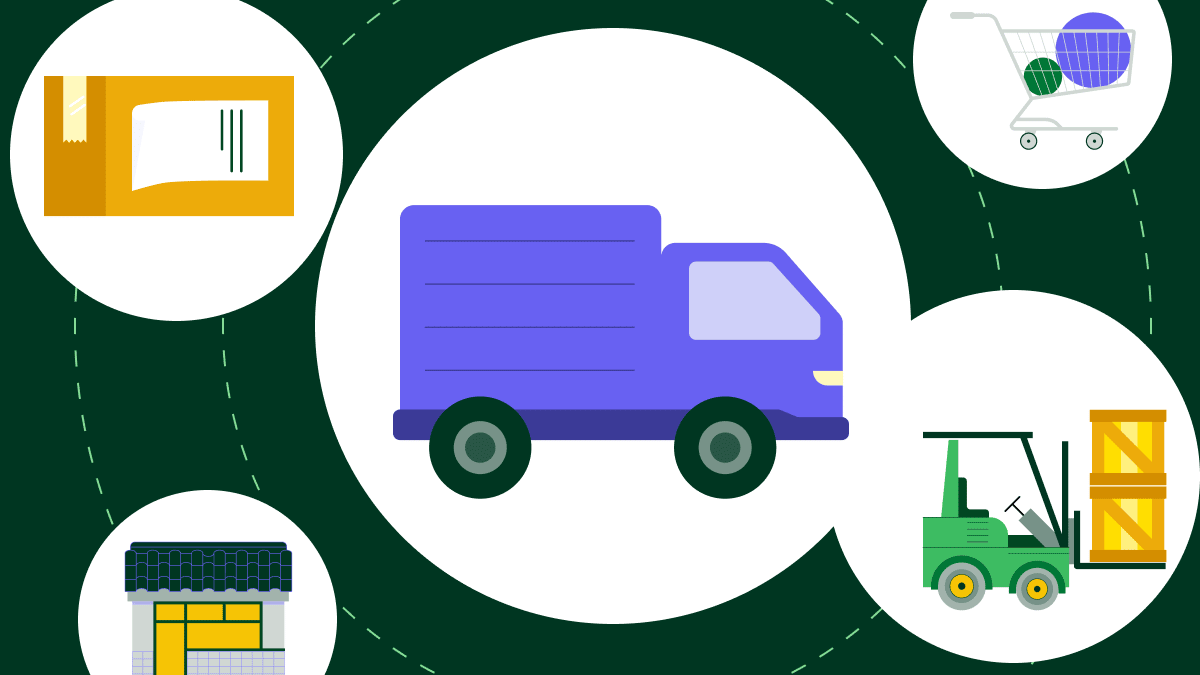Whether you’re a business owner or exploring a career in production management, efficient manufacturing processes will help you stay competitive and meet customer demands.
Understanding the key principles of production management can help you tackle challenges while optimizing your workflows.
In this article, you’ll learn how production management helps companies streamline operations to deliver high-quality products on time.
What is production management?
Production management is the process of overseeing and controlling goods manufacturing. It involves converting “inputs” (e.g., raw materials and human resources) into “outputs” (i.e., products to sell).
A company’s production process helps it use resources efficiently. It allows an organization to cut costs and ensure finished products meet quality standards.
For example, say you create solar-powered chargers. Your company may use automated assembly lines and inventory control software. These ensure you stick to your production schedule and reduce waste.
Delivering cost-effective, timely goods boosts customer satisfaction and helps you stay competitive.
Production management in business comprises three key areas:
Production planning. Developing a detailed roadmap (including steps like forecasting demand, scheduling and allocating resources). Planning ensures efficient and timely production.
Production control. Monitoring and managing production processes to meet schedules, quality control and budgets.
Process improvement. Continuously evaluating and enhancing production methods. Process improvement increases efficiency, reduces waste and boosts manufacturing performance.
Production is a crucial part of business management. However, its core processes often overlap with operations management.
Production management vs. operations management
Production management focuses on manufacturing goods, including the processes and quality assurance needed to ensure products meet standards.
Operations management oversees broader aspects of the business, including specific manufacturing processes (e.g., supply chain management).
Here’s how the two compare:
| Production management | Operations management |
| Manages the production of goods | Manages all business operations |
| Sticks to manufacturing processes | Covers production, logistics and service delivery |
| Tasked with producing goods on time, within budget and to a high standard | Tasked with improving overall efficiency and profitability |
| Uses production scheduling and manufacturing execution systems | Uses enterprise resource planning (ERP) and robotic process automation (RPA) tools |
Depending on the company’s size, the scope of these departments may overlap or involve more roles. For example, extra departments (e.g., inventory management) may handle more niche aspects of production in larger corporations.
Why is production management crucial for businesses?
Production management can help companies save money while making better products, keeping a competitive edge and achieving long-term profitability.
Here are four of the main benefits of production management systems:
1. Optimize resources to save money
Effective production management optimizes resources (e.g., labor, materials and machinery). It allows you to produce goods or services at the lowest possible cost.
Lowering production costs directly impacts your business’s profitability. For example, optimizing material usage and automating labor may allow you to lower product prices. You can then invest the savings in research and development.
2. Keep customers happy with high-quality products
Production management ensures products meet specific quality standards consistently. High quality helps you build trust and customer loyalty.
According to The Institute of Customer Service, product quality is one of the top drivers of customer trust. High-quality products also reduce the likelihood of returns or complaints. Easy transactions boost companies’ reputations.
Over time, consistent quality can encourage positive word-of-mouth and repeat business that drives more sales.
3. Reduce waste and environmental impact
Production management results like minimizing waste during production (known as lean manufacturing) and recycling ensure companies contribute to sustainability.
In addition to helping the environment, ethical business decisions also build your reputation. According to a joint McKinsey and NielsenIQ study, consumers spend more on environmentally or socially responsible products.

Studies like this one suggest that engaging in corporate social responsibility (CSR) practices doesn’t just boost your reputation. It can also have a tangible impact on sales.
4. Meet fluctuating market demands
Production management enables businesses to adapt to shifting production volumes and customer requirements. Keeping on top of processes and staying flexible allows you to respond to demand. You can scale production up or down (without significant disruptions).
For example, you could automatically increase production lines during peak seasons. The automation would help reduce delays and excess inventory.
Effective production management also increases competitiveness. It can help companies respond to new market opportunities or challenges quickly.
What does a production manager do?
A production manager ensures smooth and efficient manufacturing operations by driving productivity and maintaining high-quality standards. However, the scope of the role can vary.
Note: Production managers work with physical goods, while product managers usually oversee the development of online products and services.
For example, a startup’s production manager may handle a single assembly process and direct quality control for a small team.
On the other hand, an enterprise-level manager may oversee multiple production lines and manage large teams across different facilities.
Here are the typical responsibilities of a production manager:
Control daily production operations. Ensuring team productivity, maintaining equipment efficiency and promptly resolving any production issues or bottlenecks.
Develop and implement production schedules. Monitoring production plans to maintain product quality and consistency to meet customer demands.
Coordinate with other departments. Working closely with the operations manager to streamline and improve processes to enhance production efficiency.
Manage and train production staff. Maintaining a skilled workforce and ensuring compliance with safety regulations and quality standards.
Track production metrics. Managing inventory levels of raw materials and generating reports for upper management.
Whether you want to become a production manager or hire one, people with specific qualities and management styles will handle these responsibilities more efficiently.
Download your guide to managing teams and scaling sales
8 essential qualities that make a hireable production manager
Successful production managers lead a team, oversee resources and ensure smooth production processes.
A good production manager can be the difference between consistent, high-quality output at a lower cost and expensive production delays or inefficiencies.
Here are eight essential qualities and soft skills a production manager should possess:
| Production manager quality | What that looks like in practice |
| Leadership skills | Inspires and motivates the team to reach production goals while fostering a positive, collaborative work environment |
| Problem-solving skills | Overcomes issues by rallying the production team to fix them rather than trying to blame someone for mistakes |
| Communication skills | Balances conveying expectations and explaining senior management’s decisions with advocating for employees |
| Friendliness | Builds rapport by getting involved on the shop floor, learning everyone’s names and engaging in genuine conversations |
| Attention to detail | Ensures every part of the production process runs smoothly, catching errors before they become significant problems |
| Technical expertise | Possesses in-depth knowledge of machinery and processes to guide operations, deal with equipment maintenance and troubleshoot issues |
| Time management | Prioritizes tasks and manages deadlines effectively to ensure production stays on schedule and meets demand |
| Adaptability | Able to stay flexible and quickly adjust plans or processes when faced with unexpected challenges or new technologies |
Understanding process improvement and quality management methodologies (e.g., Six Sigma) is also beneficial. For example, an experienced production manager may implement automations that reduce material waste and cut costs by 15%.
Production managers with these skills help keep operations running smoothly and employees satisfied. They also play a critical role in contributing positively to the bottom line of any manufacturing operation.
3 types of production management software to streamline your operations
Production management software helps businesses digitize and automate manufacturing processes to increase efficiency, reduce errors and enhance decision-making with data.
While operations managers tend to deal with ERP and supply chain management software, here are three essential types for production managers:
1. Production planning and scheduling software
Production planning software helps managers forecast demand, create schedules and control the use of resources.
These elements ensure that companies produce enough products to fulfill orders and avoid overproduction or shortages.
For example, you could use a tool like Visual Planning to visualize your production schedule and spot delays or bottlenecks as they happen.

Visual Planning is often considered a simpler, more user-friendly tool in its sector. Easily move resources around Gantt charts to ensure you always adequately cover and time all aspects of your production project.
You could also use an AI-powered tool like Checkmate to automatically make workflow decisions and monitor risks.
Here’s how Checkmate optimizes scheduling in seconds:
Use its machine-learning algorithms to simulate the impact of changes on your production plan and get the most out of available capacity.
2. Project management tools
Project management software helps managers organize production-related projects (e.g., new product designs and process improvements).
Keeping all ideas and timelines on one centralized system helps production teams plan and coordinate projects and complete them on time and within budget.
You can use a standalone project management tool like Asana or Trello. You can also use software built into your customer relationship management (CRM) platform.
Combining these tools can help ensure your customers’ needs are aligned with any production project goals, creating more relevant final products that boost sales.
For example, Pipedrive’s Projects helps production managers track ideas, manage deadlines and collaborate across teams.

The Kanban view allows you to track all project-related activities in real time, while the drag-and-drop dashboard means no steep learning curve for users.
Use Projects to create phases, assign labels and add notes to organize your production plans. You can also schedule and automate specific activities to ensure you always reach your milestones and goals.
Note: Try Pipedrive’s manufacturing CRM to improve operational efficiency while managing distributors, retailers and sales cycles in one place.
3. Manufacturing execution systems (MES)
Manufacturing execution systems monitor the production process on the shop floor. These tools provide real-time data on activities, equipment status and workflows so you can prevent minor issues from turning into significant delays.
Real-time visibility and control over manufacturing processes help teams minimize downtime and improve product quality.
Managers can also track every aspect of production as it happens and work toward continuous improvement.
For example, MasterControl’s cloud-based MES lets you digitize your production records and improve each production stage – from inbound materials to batch execution.

Use it to turn paper-based processes into user-friendly dashboards for digitally customizing, managing and executing operations.
Another option is NoMuda’s Visual Factory. This MES also helps companies switch to digital work instructions to create more efficient shop floors that always meet quality standards.

Visual Factory supports thousands of product variants. You can even connect the software to your ERP to save time by automatically changing instructions based on your work orders.
Final thoughts
Understanding the importance of production management allows you to optimize resources, save money and keep customers happy with high-quality products.
However, a successful production manager is only as effective as their tools. Take the time to research and invest in a tech stack that can streamline your unique operations and boost productivity.
For a robust CRM and project management tool that integrates seamlessly with your ERP, try Pipedrive’s 14-day free trial.







